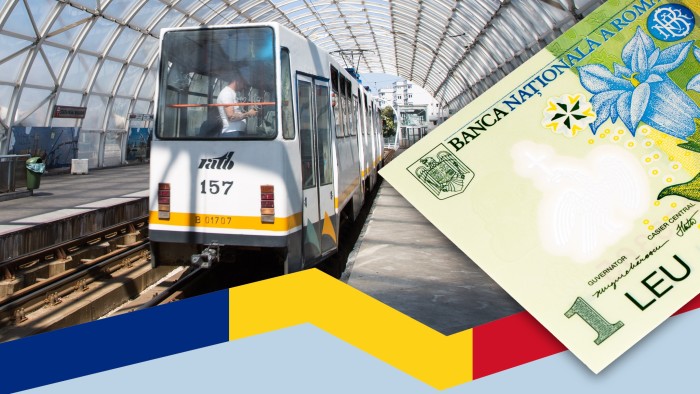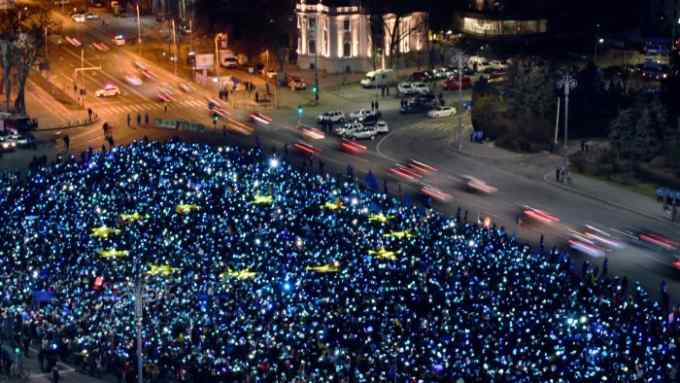How Romania became a popular tech destination

Simply sign up to the European companies myFT Digest -- delivered directly to your inbox.
At first glance Romania seems an unlikely base for cutting-edge tech start-ups. Even regular visitors associate it with misty mountains, medieval churches and potholed roads.
But US wearable technology company Fitbit’s acquisition of Romania’s Vector Watch in January seemed to confirm that Romania’s science-savvy workforce, a sizeable and growing domestic market, and EU membership make it a promising European destination for tech investors.
The downside has been an under-developed and fragmented funding environment, but a wave of recent deals indicate the tech sector’s growing vigour.
“What I find most impressive and reassuring is the active number of young tech entrepreneurs, kids in their early 20s, who have the imagination and power to challenge a global start-up ecosystem,” says Eric Friedman, Fitbit’s co-founder, adding: “The evolution of the tech start-up scene in Romania is highly positive. New investment funds and business angels support more and more tech-based start-ups.”
The Vector Watch acquisition is seen as proof of Romania’s potential. Launched in 2015 by Romanian tech entrepreneur Andrei Pitis, the company won international praise for its watches’ 30-day battery life, cross-functionality, and design. The acquisition was not only adding to Fitbit’s product range. Mr Friedman said it was using Vector Watch — which has a commercial presence in 27 countries — to boost its presence in Europe, the Middle East and Africa and to help it establish a development centre in Bucharest.

Romania has been a favoured IT outsourcing destination for many years, with competitive advantages including its domestic market of 20m, one of Europe’s fastest-growing economies, and young graduates with good language skills. The country can also build on its communist legacy of excellence in science, mathematics, and technical education. The focus is shifting to using these to develop homegrown innovative companies.
“There are a lot of people who have technical and software development capabilities,” says Mircea Vadan, a tech entrepreneur and founder at Cluj Startups. “Compared with most other central and eastern European countries, Romania has the advantage of numbers — more human resources. It’s easier to find talent. Being part of EU is also an advantage compared with Ukraine, which is bigger in size and has a lot of talent, but is going through a tough period.”
In turn, entrepreneurship has been boosted by the demand for skilled professionals; when one company fails, it is easy for its employees to find work elsewhere. Furthermore, rents are relatively low — around half those in Berlin, according to InvestRomania. Salaries, while rising, are affordable by western European standards, with the annual average for a software developer coming in around €17,000. A number of cities now boast budding start-up scenes, most notably Bucharest and the Transylvanian university city of Cluj, as well as Brasov and Timisoara.
Romanian start-ups raised €11.3m in 2016, while the total value of exits was €72m (counting only publicly known figures), according to Bogdan Ceobanu, a former entrepreneur now in the European Commission’s start-ups and innovation unit. In the first eight months 2017, funding rose to €38.4m. This was largely driven by Romania’s biggest-ever series A round — $30m raised by UiPath, a developer of robotic process automation software that has big multinational clients.
Another Romanian success is Clever Taxi, a developer of ride-hailing apps acquired by Daimler’s mytaxi in June for an undisclosed sum. Clever Taxi was founded in 2010 and has 17,000 drivers and 600,000 customers in Romania — an example of how the size of the local market allows Romanian start-ups to scale up. As with Vector Watch, the acquisition is expected to boost research and development in Bucharest.

Overseas companies often have “Romanian DNA”. When Facebook acquired video advertising optimisation start-up LiveRail for a reported $400m-500m in 2014, the Romanian government and press pointed out that two of its founders were Romanian and the company had an office in Cluj. Social analytics platform UberVU, acquired by Canadian social media company Hootsuite for $15m-20m in 2014, was also founded by Romanians.
It is fairly normal for tech entrepreneurs from smaller and emerging markets to establish themselves in places like Silicon Valley, Berlin, London. They take advantage of established start-up ecosystems and have more chances to meet investors and partners. Start-up finance in Romania can be hard to come by, according to Peter Barta, an angel investor and VC fund manager.
He says: “Most of the financing comes from state subsidies or public financing, either through grants or through fiscal facilities. The business angel community is less developed and not very well organised. It lacks transparency, and few deals are happening.”
Particularly lacking, according to Cluj Startups’ Mr Vadan, is seed and series A financing for amounts of €50,000-€100,000 and €300,000-€500,000.
Try the FT’s dynamic country data dashboard

Romania: latest news and live data
See the latest Romanian business and finance news, alongside economists’ forecasts for GDP, inflation, current account and the leu-euro exchange rate — all in one place
Successful VC players are active in Romania — not least Gecad Ventures, which successfully exited Vector Watch and RAV Antivirus (sold to Microsoft in 2003). However, overall venture capital investments in Romania are equal to just 0.001 per cent of GDP, compared to the EU average of 0.027 per cent, according to Invest Europe. The country’s range of well-organised incubators and accelerators tend to focus on mentoring and linking start-ups to angel investors, rather than providing funding themselves.
This has led some start-ups to turn to crowdfunding via global platforms such as Kickstarter and Indiegogo. Mr Barta says successful examples of such fundraising include Sound Heroes, which raised about €447,000 to develop a Bluetooth speaker, and smartwatch developer Dagadam Watch, which raised €140,000.
Adrian Pica, a tech journalist and start-up expert, says there would be more angel investment if backers felt there were more viable businesses generating revenues. But he says too many entrepreneurs lack the necessary experience in developing a business.
The successful UiPath funding round is not the only sign that things are changing, however. In April, Romanian travel tech company dcs plus raised $6.2m from investors. Last year, the European Investment Fund and Romania’s ministry for European funds signed an agreement that will make available €40m dedicated to entrepreneurship accelerators and seed funds for innovative companies.
Mr Vadan reckons this “will probably change the investment landscape”.

Comments